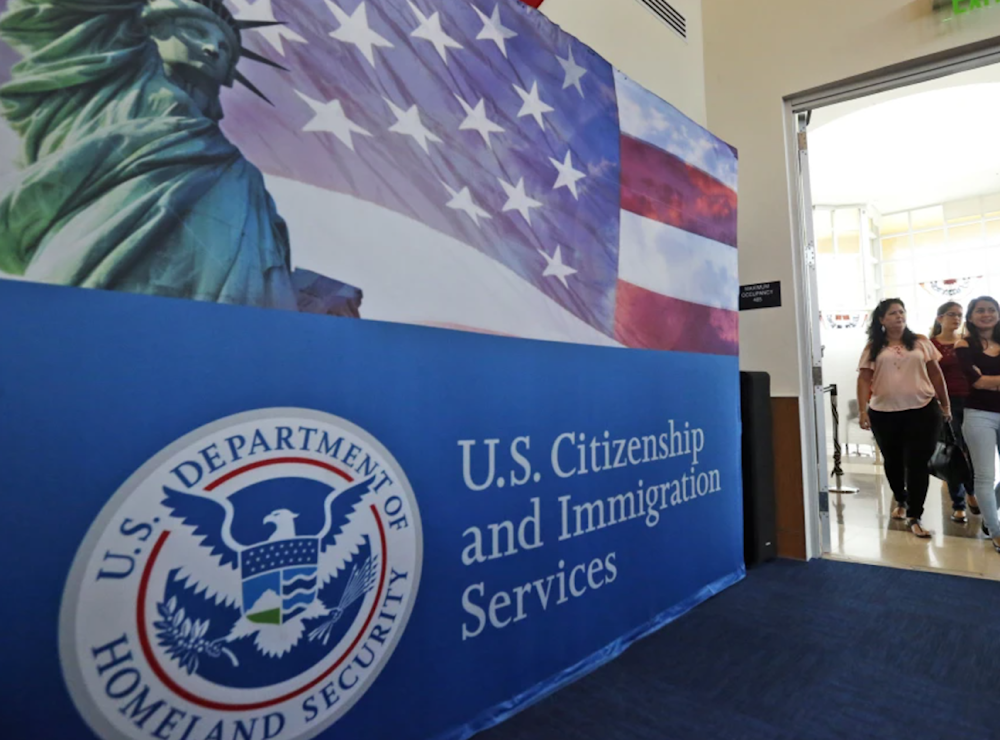Trump administration halts certain green card applications
The Trump administration halted certain green card applications for refugees and asylum seekers, citing national security concerns, which has led to delays in permanent residency and raised fears of deportation.
-

People arrive before the start of a naturalization ceremony at the US Citizenship and Immigration Services Miami Field Office in Miami on August 17, 2018 (AP)
The Trump administration has halted certain green card applications, which could affect thousands of people who arrived in the United States as refugees or asylum seekers.
National Immigrant Justice Center Director of Policy Azadeh Erfani told Newsweek Tuesday that two executive orders signed by President Donald Trump caused the halt.
"This sweeping and indefinite stop on green card processing is yet another attempt for this administration to baselessly paint all immigrants as a national security risk," Erfani detailed.
The hold might mean that thousands of applicants would have to wait even longer for permanent residency as the Trump administration dismantles some of the legal channels they took to get there. Trump has pledged to deport millions of illegal immigrants during his presidency, but some supporters are concerned that individuals without criminal histories would be included to bolster the statistics.
Between October 2023 and September 2024, asylum seekers filed at least 67,800 green card applications, while over 40,000 were submitted by refugees, who can only apply if they arrived at least a year earlier.
The average wait period for such applications to be decided by the United States Citizenship and Immigration Service (USCIS) was about 10 and 8 months, respectively.
The DHS stated that the action was the result of two executive orders issued by Trump: "Protecting The United States From Foreign Terrorists And Other National Security And Public Safety Threats" and "Designating Cartels And Other Organizations As Foreign Terrorist Organizations And Specially Designated Global Terrorists."
The first directed agencies, including DHS, to strengthen the vetting and screening of those seeking legal status in the United States. This encompassed both individuals attempting to enter the nation and those who had previously been accepted from countries classified as "security risks."
One refugee rights organization told Newsweek that it was watching the situation to see how many individuals would be affected, as USCIS flags applications on occasion.
Many refugees and asylum seekers come to the US fleeing conflict, unstable governments, or natural disasters. Despite Trump's criticism of the previous administration's immigration procedures, refugees undergo extensive vetting, including medical exams and interviews. The suspension of green card applications and the elimination of programs like humanitarian parole for certain nationalities may lead to deportation or detention for those who entered under these programs.
Erfani explained how the action is discriminatory as USCIS "already conducts extensive vetting of all individuals who apply for permanent resident status."
According to a representative for the Department of Homeland Security, "To better identify fraud, public safety, or national security concerns, USCIS is placing a temporary pause on finalizing certain Adjustment of Status applications pending the completion of additional screening and vetting."
David Bier, director of immigration research at the Cato Institute, expressed on X that these applications "already have insane wait times, and Trump is freezing them solely to make it easier to deny and deport them."
The Trump administration has faced court challenges over the elimination of refugee and parole programs, as it continues to enhance immigration enforcement and scrutiny of green card and visa applications, including an investigation into social media remarks.
Trump administration weighs travel ban on 43 countries: Report
The Trump administration is also weighing new travel restrictions on citizens from 43 countries as part of its latest immigration crackdown, which began at the start of the president’s second term.
According to an internal memo seen by Reuters, the affected nations are categorized into three groups. The first group, which includes Afghanistan, Iran, Syria, Cuba, and DPRK, would face a full visa suspension.
A second group, comprising Eritrea, Haiti, Laos, Myanmar, and South Sudan, would see partial suspensions impacting tourist, student, and some immigrant visas, though certain exceptions would apply.
The third group includes 26 nations, such as Pakistan, Belarus, and Turkmenistan, which would face a partial suspension of visa issuance unless their governments address "deficiencies" within 60 days.
A US official, speaking anonymously, indicated that the list could change and has yet to receive final approval from the administration, including Secretary of State Marco Rubio.
The order required cabinet members to recommend by March 21 which countries should face full or partial travel restrictions due to "deficient vetting and screening information."
In October 2023, Trump pledged to block entry from Gaza, Libya, Somalia, Syria, Yemen, and "anywhere else that threatens our security."
This move echoes Trump’s 2017 travel ban on seven majority-Muslim nations, a policy that was challenged in court but ultimately upheld by the Supreme Court in 2018.

 5 Min Read
5 Min Read








